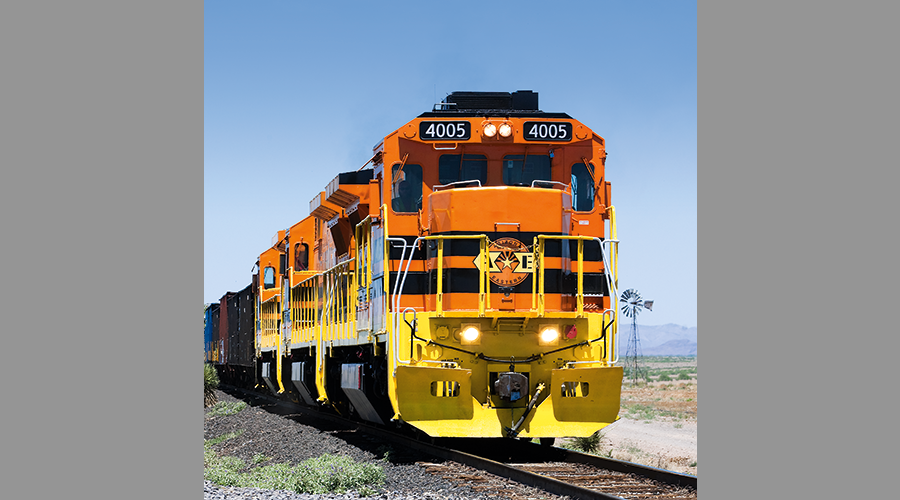Stay updated on news, articles and information for the rail industry
March 2015
Rail News: Short Lines & Regionals
Northern Lights Rail to join growing roster of small railroads in Saskatchewan
By Jeff Stagl, Managing Editor
Sometime in May, Northern Lights Rail will move its first train between Birch Hills and Melfort, becoming the 14th short line to launch operations in Saskatchewan. The railroad will join a growing roster of short lines in the province that already includes the Carlton Trail Railway, Thunder Rail, Great Sandhills Railway, Long Creek Railroad and Big Sky Rail Corp.
Owned by numerous farmers and nine rural municipalities in Saskatchewan, Northern Lights Rail will operate a 37-mile line acquired from CN. The short line primarily will move grain between Birch Hills and Melfort, but transport other commodities, as well.
Farmers in the region grew tired of trucking their grain to area elevators and waiting in line for perhaps one or two hours, says Wayne Bacon, a long-time Kinistino, Saskatchewan, farmer who serves as president of Northern Lights Rail. In addition, the cost of fuel to truck grain has risen.
There are a number of opportunities to move various ag products — such as oats and barley — on the former CN route.
“This line was bought for grain,” Bacon says.
Northern Lights Rail will haul grain from new loading facilities under construction in Kinistino and Beatty to Melfort, where the short line will interchange with CN. The short line plans to build another loading facility in Birch Hills after track is upgraded.
CN would move the grain products to points on the East Coast or to Quebec, and some products might be transported south to U.S. destinations, says Bacon. Northern Lights Rail initially expects to move 600 to 800 grain cars per year, but annual traffic eventually could increase to 1,000 or more carloads after local farmers become more comfortable with loading their own rail cars.
Efforts to create the short line and acquire the CN line — which was targeted for abandonment — began more than two years ago. In April 2013, a steering committee was formed by the city of Melfort; village of Beatty; towns of Birch Hills, Kinistino and Weldon; and rural municipalities of Birch Hills, Invergordon, Kinistino and Flett Springs.
The committee completed an engineering study that determined the track was in a safe condition, says Bacon. Committee members also held two informational meetings and met individually with area farmers.
The ownership group formed by the municipalities and farmers then began negotiating with CN to purchase the line. The Class I’s cost to operate the line “was huge,” in part because of unionized labor costs, says Bacon, adding that Northern Lights Rail workers won’t be organized. The short line likely will be operated by one person, with five or six local farmers pitching in, he says.
“Short lines in Saskatchewan are typically operated by one or two people, except if they move crude oil, because then they are busy,” says Bacon.
The ownership group reached an agreement with CN and purchased the line, in part with a $550,000 interest-free loan provided by the Saskatchewan government. The deal was the product of “a good working relationship” between the municipalities, farmers, CN and Ministry of Highways and Infrastructure, says Bacon.
The line now has been turned over to an organized group — Northern Lights Rail Ltd. — to operate it. Bacon runs a fourth-generation farm and has experience with different commodity groups, but no rail experience, he says. He previously served as president of the Canadian Canola Growers Association and chairman of the Saskatchewan Canola Development Commission, and is a member of the Hudson Bay Route Association, which is trying to expand the Port of Churchill.
The short line’s start-up date is in flux because a refurbished locomotive purchased in October 2014 hadn’t been delivered as of late March. In addition, snow hasn’t melted enough to enable a necessary track inspection to be performed.
But Bacon is confident that Northern Lights Rail will be up and running sometime in May. He’s also certain the line will be a huge asset for the area.
“Retaining rail infrastructure is important for supporting agriculture and economic development in the region,” says Bacon.
Keywords
Browse articles on Northern Lights Rail CN Ministry of Highways and Infrastructure short lineContact Progressive Railroading editorial staff.


 2025 MOW Spending Report: Passenger-rail programs
2025 MOW Spending Report: Passenger-rail programs
 Gardner steps down as Amtrak CEO
Gardner steps down as Amtrak CEO
 Guest comment: Oliver Wyman’s David Hunt
Guest comment: Oliver Wyman’s David Hunt
 Women of Influence in Rail eBook
Women of Influence in Rail eBook
 railPrime
railPrime








